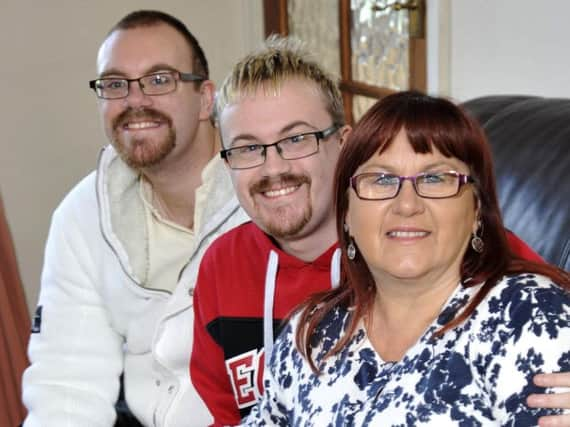'˜We weren't told it may harm our children'


Janet Williams, 53, from School Lane, Pilling, was one of thousands of woman prescribed the drug Epilim to stop seizures while she was pregnant with her two sons, Lee, now 28, and Philip, 26.
She had no idea that a key ingredient in the drug , valproic acid, could cause her unborn babies to develop birth defects, sight problems, learning difficulties, and memory issues.
Advertisement
Hide AdAdvertisement
Hide AdShe has welcomed new legislation from the Medicines and Healthcare Products Regulatory Agency (MHRA), banning drugs containing valproate among women and girls of a childbearing age, unless they have a birth control programme in place.
She said: “It’s absolutely brilliant. It has taken years but we have finally got there.
“We never wanted it banning completely because we know what a fantastic job it can do, but I think it is really necessary to reduce its use among women of child-bearing age.
“We want to stop children being harmed by the drug.”
Janet is the co-founder of the Fetal Anti Convulsant Syndrome Association, which champions the rights of women and children affected by valproate.
Advertisement
Hide AdAdvertisement
Hide AdA 1973 document, uncovered by the association, showed the committee on safety of medicines did not believe the evidence Epilim was harmful to unborn babies was sufficiently conclusive.
It decided warnings should be withheld from the public to prevent ‘fruitless anxiety’.
Though doctors were made aware of the health risks, written warnings were not included in package inserts, a move which saw Janet embark on a legal battle that last for three years.
She met representatives from the Department of Health and Medicines, and Healthcare Products Regulatory Agency.
Advertisement
Hide AdAdvertisement
Hide AdShe took the fight to health minister Jeremy Hunt, and life sciences minister George Freeman in Parliament.
Finally, she triumphed, with bosses agreeing a warning should be added to Epilim, telling women of the life-changing effects it could have.
She said: “I have been fighting this fight for 22 years, ever since I started my first support group in 1999.
“Thousands of women are being prescribed the drug every single year.
Advertisement
Hide AdAdvertisement
Hide Ad“People have suffered tremendously because of this drug, and to think that could be cut down is really positive.
“It was a really big day for us. People have been expressing their support. So many women have called me saying how happy they are.”
But the news comes too late for an estimated 20,000 people in the UK, who are believed to have been born with disabilities due to valproate since the drug was introduced in the 1970s.
For Janet, the fight for them will never be over.
She said: “We weren’t told that it may harm our children. My sons have both been affected. My eldest son has scoliosis and it causes him a lot of pain.
“My youngest son will never be able to live independently.
Advertisement
Hide AdAdvertisement
Hide Ad“Being 53, it worries me what will happen to my boys when I’m gone. I’m not getting any younger.
“The next step for us is to keep on pushing for a care plan for those with Fetal Valproate Syndrome, and compensation for the families who have been affected.
“The majority of people who come to us are in the same situation as we are. We have a small number of children who come to our doors who have spina bifida and kidney problems.
“These families were not given an informed choice. Doctors knew about the risks. They were fully aware back in the ‘70s.
Advertisement
Hide AdAdvertisement
Hide Ad“The ban is a huge achievement. Our plan now is to ensure that these families are looked after.”
Move means ‘informed choice’
Clare Pelham, chief executive of the Epilepsy Society charity, said: “The most important change is that every woman and girl of childbearing age, who has been prescribed sodium valproate, will be able to see her doctor every year to discuss the risks of this drug to an unborn baby.
“She will leave the discussion with an important written reminder of the risks if sodium valproate is taken during pregnancy.
“This means that she will be able to make informed choices about whether to plan a pregnancy and her future medical treatment.